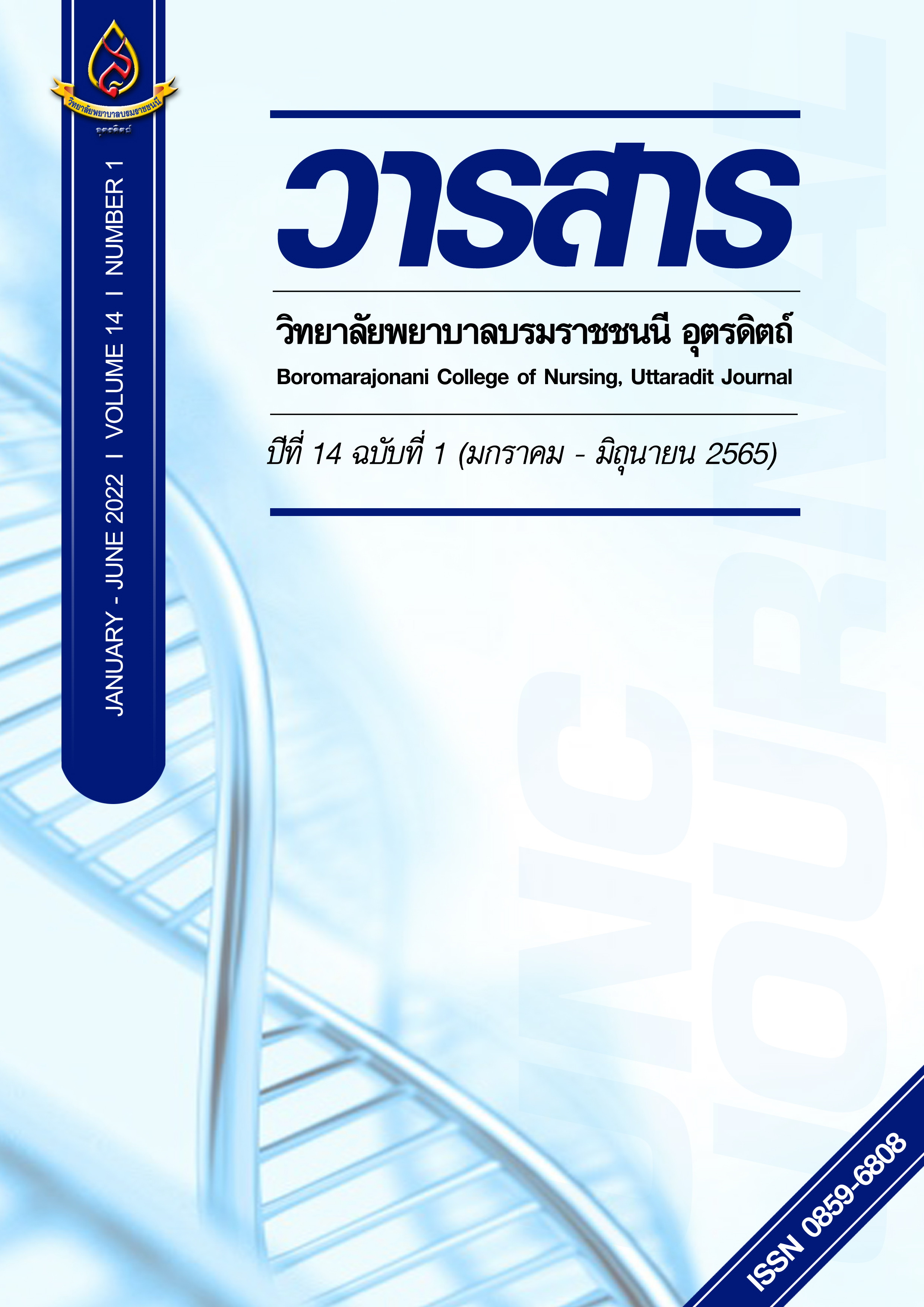รูปแบบการส่งเสริมการรับรู้สมรรถนะแห่งตนต่อพฤติกรรมการเลี้ยงลูกด้วยนมแม่ของมารดาวัยรุ่นหลังคลอดที่อาศัยในครอบครัวข้ามรุ่น
Main Article Content
บทคัดย่อ
การวิจัยนี้ใช้ระเบียบวิธีวิจัยและการพัฒนานี้ เพื่อพัฒนารูปแบบการส่งเสริมการรับรู้สมรรถนะแห่งตนต่อพฤติกรรมการเลี้ยงลูกด้วยนมแม่ของมารดาวัยรุ่นหลังคลอดที่อาศัยในครอบครัวข้ามรุ่น ผู้ให้ข้อมูลหลักในการพัฒนาต้นแบบ ได้แก่ มารดาวัยรุ่นหลังคลอด และญาติในครอบครัวข้ามรุ่น รวมจำนวน 6 คน และมีผู้ทรงคุณวุฒิในการพัฒนารูปแบบฯ จำนวน 5 คน กลุ่มตัวอย่างในการทดลองรูปแบบฯ เป็นมารดาวัยรุ่น จำนวน 48 คน ซึ่งจัดเข้าเป็นกลุ่มทดลองและควบคุม กลุ่มละ 24 คน จากนั้นถอดบทเรียนกับกลุ่มผู้ใช้รูปแบบและมีส่วนได้ส่วนเสีย จำนวน 8 คน
ผลการศึกษา พบว่า รูปแบบการส่งเสริมการรับรู้สมรรถนะแห่งตนต่อพฤติกรรมการเลี้ยงลูกด้วยนมแม่ของมารดาวัยรุ่นหลังคลอดที่อาศัยในครอบครัวข้ามรุ่น ส่งเสริมความมั่นใจในการเลี้ยงลูกด้วยนมแม่ เมื่อมารดาวัยรุ่นและครอบครัวข้ามรุ่นยอมรับการมีสมาชิกใหม่ของครอบครัว ซึ่งดำเนินการในรูปแบบออนไลน์ รายละเอียด ดังนี้ 1) ประเมินความพร้อมทางด้านร่างกาย จิตใจ และความตั้งใจ 2) เล่าประสบการณ์และเปิดคลิปดาราหรือผู้มีชื่อเสียงที่วัยรุ่นชื่นชอบ ที่ประสบความสำเร็จในการเลี้ยงลูกด้วยนมแม่ 3) ให้คำแนะนำต่างๆ อย่างสม่ำเสมอผ่าน ช่องทางยูทูป และไลน์ แจกของขวัญ และให้คำชมเชยด้วยการส่งข้อความหรือสติกเกอร์ 4) เป็นที่ปรึกษาและมีช่องทางติดต่อออนไลน์กับครอบครัว และมารดาวัยรุ่นรายบุคคล 5) ติดตาม ระยะ 1-2 สัปดาห์แรก เน้นการแลกเปลี่ยนประสบการณ์ ให้กำลังใจมารดาวัยรุ่น และครอบครัวข้ามรุ่น จากนั้น ระยะ 12 สัปดาห์หลังคลอด เน้นติดตามพัฒนาการ และความเปลี่ยนแปลงของบุตร ภายหลังทดลองรูปแบบการส่งเสริมการรับรู้สมรรถนะแห่งตนฯ พบว่า 1) กลุ่มทดลองมีคะแนนเฉลี่ยความรู้ การรับรู้สมรรถนะแห่งตนและพฤติกรรมการเลี้ยงลูกด้วยนมแม่ของมารดาวัยรุ่นฯ สูงกว่าก่อนทดลอง อย่างมีนัยสำคัญทางสถิติที่ระดับ .05 (p<.001) 2) กลุ่มทดลองมีคะแนนเฉลี่ยความรู้เรื่องการเลี้ยงลูกด้วยนมแม่ การรับรู้สมรรถนะแห่งตน และพฤติกรรมการเลี้ยงลูกด้วยนมแม่ สูงกว่ากลุ่มควบคุมอย่างมีนัยสำคัญทางสถิติที่ระดับ .05 (p<.001)
ผลการวิจัยครั้งนี้แสดงให้เห็นว่ารูปแบบการส่งเสริมการรับรู้สมรรถนะแห่งตนต่อพฤติกรรมการเลี้ยงลูกด้วยนมแม่ของมารดาวัยรุ่นหลังคลอดที่อาศัยในครอบครัวข้ามรุ่น เป็นรูปแบบการส่งเสริมการรับรู้สมรรถนะแห่งตนในรูปแบบออนไลน์มีประสิทธิภาพ สามารถนำไปใช้ส่งเสริมความมั่นใจในการเลี้ยงลูกด้วยนมแม่ของมารดาวัยรุ่นหลังคลอดที่อาศัยในครอบครัวข้ามรุ่น เพื่อให้มารดาวัยรุ่นสามารถเลี้ยงบุตรด้วยนมตนเองอย่างต่อเนื่อง
Article Details

อนุญาตภายใต้เงื่อนไข Creative Commons Attribution-NonCommercial-NoDerivatives 4.0 International License.
บทความหรือข้อคิดเห็นใดใดที่ปรากฏในวารสารวิจัยการพยาบาลและวิทยาศาสตร์สุขภาพ เป็นวรรณกรรมของผู้เขียน ซึ่งบรรณาธิการหรือสมาคมศิษย์เก่า ไม่จำเป็นต้องเห็นด้วย และบทความที่ได้รับการตีพิมพ์เผยแพร่ถือเป็นลิขสิทธิ์ของวารสารวิจัยการพยาบาลและวิทยาศาสตร์สุขภาพ
เอกสารอ้างอิง
Bandura, A. (1997). Self-efficacy: The exercise of control. New York: W. H. Freeman and company.
Chansiri, S., Phahuwatanakorn, W. & Yusamran, C. (2018). Influences of breastfeeding attitude, subjective norm, and self-efficacy on intention to exclusive breastfeeding among teenage pregnant women. Nursing Science Journal of Thailand, 35(4), 49-60. (in Thai).
Cheevakasemsook, A. (2021). Nursing documentation in new normal Era. Royal Thai Navy Medical Journal, 48(1), 184-198. (in Thai).
Chompukum, P. & Chakrapeesirisuk, N. (2020). Factors affecting job satisfaction and motivation: A case comparison of generation Y and generation Z in Bangkok. Chulalongkorn Business Review, 42(3), 1-18. (in Thai).
Dennis, C. L. (1999). Theoretical underpinnings of breastfeeding confidence: a self-efficacy framework. Journal of Human Lactation, 15(3), 195-201.
Dennis, C. L. (2010). Development of the Breastfeeding Self-Efficacy Theory. Retrieved (2021, September 10) form http://www.cindyleedennis.ca/research/1-breastfeeding/breastfeeding-self-efficacy/
Department of Health, Ministry of Public Health. (2020). Policy and Strategic Reproductive. Retrieved (2021, September 10) from http://202.29.80.118/datas/document/PolicyandStrategy/strategic/strategic-reproductive-59.pdf
Department of Women's Affairs and Family Development, Ministry of Social Development and Human Security. (2019). Definition and types of family structure. Retrieved (2021, September 10) from http://intranet.dop.go.th/intranet_older/fls/fls_uploads/52747/%E0%B8%99%E0%B8%B4%E0%B8%A2%E0%B8%B2%E0%B8%A1%E0%B9%81%E0%B8%A5%E0%B8%B0%E0%B8%9B%E0%B8%A3%E0%B8%B0%E0%B9%80%E0%B8%A0%E0%B8%97%E0%B8%84%E0%B8%A3%E0%B8%AD%E0%B8%9A%E0%B8%84%E0%B8%A3%E0%B8%B1%E0%B8%A7.pdf.
Jekel, J., Elmore, JG., Katz, DL., & Wild, D. (2007). Epidemiology, biostatistics and preventive medicine and public health. Philadelphia: Elsevier Health Science.
Jintrawet, U., Somboon, L., & Thongsawat, T. (2010). Evaluation of Self-efficacy in Breastfeeding (Doctoral dissertation) Chiangmai University. (in Thai).
Kulaphanich, M., Supavititpatana, B., & Chaloumsuk, N. (2019). Effect of self-efficacy enhancement on breastfeeding among adolescent mothers. Nursing Journal, 46(2), 36-46. (in Thai).
Lertsakornsir, M. (2019). Breastfeeding promotion in adolescent mothers: roles of nurses and families. Journal of Nursing and Education, 12(1), 1-13. (in Thai).
Mekkamol, K. (2019). Breastfeeding promotion: community practice guideline. The Southern College Network Journal of Nursing and Public Health, 5(3), 274-286. (in Thai).
Nakamadee, B., Rungchay, A., Dumminsek, P. & Juiphuang, N. (2020). Promotion of breastfeeding among Teenage Mothers: Nurses’ Roles in Tambon Health Promoting Hospital. Journal of Nurses Associate of Thailand Northern Office, 26(2), 90-103. (in Thai).
National Statistical Office. (2016). Survey of the situation of children and women in Thailand 2015-2016 Retrieved (2016, September 17). from http://service.nso.go.th/nso/nsopublish/ themes/files/child-women58.pdf (in Thai).
National Statistical Office of Thailand. (2021). Thailand multiple indicator cluster survey 2019, report of 17 selected provinces. Bangkok, Thailand: National Statistical Office of Thailand. Retrieved (2016, September 17) from https://www.unicef.org/thailand/media/6096/file/%E0%B8%81%E0%B8%B2%E0%B 8%A3%E0%B8%AA%E0%B8%B3%E0%B8%A3%E0%B8%A7%E0%B8%88%E0%B8% AA%E0%B8%96%E0%B8%B2%E0%B8%99%E0%B8%81%E0%B8%B2%E0%B8%A3% E0%B8%93%E0%B9%8C%E0%B9%80%E0%B8%94%E0%B9%87%E0%B8%81%E0% B9%81%E0%B8%A5%E0%B8%B0%E0%B8%AA%E0%B8%95%E0%B8%A3%E0%B8 %B5%E0%B9%83%E0%B8%99%2017%20%E0%B8%88%E0%B8%B1%E0%B8%87% E0%B8%AB%E0%B8%A7%E0%B8%B1%E0%B8%94%E0%B8%82%E0%B8%AD%E0 %B8%87%E0%B8%9B%E0%B8%A3%E0%B8%B0%E0%B9%80%E0%B8%97%E0%B8 %A8%E0%B9%84%E0%B8%97%E0%B8%A2%20%E0%B8%9E.%E0%B8%A8.%2025 62.pdf.
Phetyoo, J., Kantaruksa, J. Sansiriphun, N. (2020). Effect of a web-based instruction program on breastfeeding self-efficacy among pregnant women. Nursing Journal, 47(2), 227- 239. (in Thai).
Pentecost, R., & Grassley, J. S. (2013). Adolescent’s needs for nurse’ support when initiating breastfeeding. Journal of Human Lactation, 30 (2), 224-228.
Rueangseree, M. (2017). Factors affected to exclusive breastfeeding only at least 6 month of adolescent postpartum mothers attending health promoting hospitals Muang district Ubon Ratchathani Province. UBRU Journal for Public Health Research, 6(1), 37-48. (in Thai).
Smith, P. H., Coley, S. L., Labbok, M. H., Cupito, S., & Nwokah, E. (2012). Early breastfeeding experiences of adolescent mothers: A qualitative prospective study. International Breastfeeding Journal 2012, 7(1), 7-13.
Somjai, C., Kantaruksa, K. & Chaloumsuk, N. (2020). Effectiveness of breastfeeding self-efficacy enhancement: a systematic review. Nursing Journal, 47(2), 227-239. (in Thai).
Thai Health Promotion Foundation. (2017). The power to create a sustainable breast milk society. Retrieved (2020, March 16). from https://content/ 38063- 20%20.html (in Thai)
Thianlai, K. & Hutaphaed, W. (2019). Distance people: communication of skipped generation household. Journal of Social Development, 21(1), 59-75. (in Thai).
Wu, D. S., Hu, Jie, McCoy, Thomas, P., & Efird, J. T. (2014). The effects of a breastfeeding self-efficacy intervention on short-term breastfeeding outcomes among primiparous mothers in Wuhan, China. Journal of Advanced Nursing, 70(8), 1867-1879.


